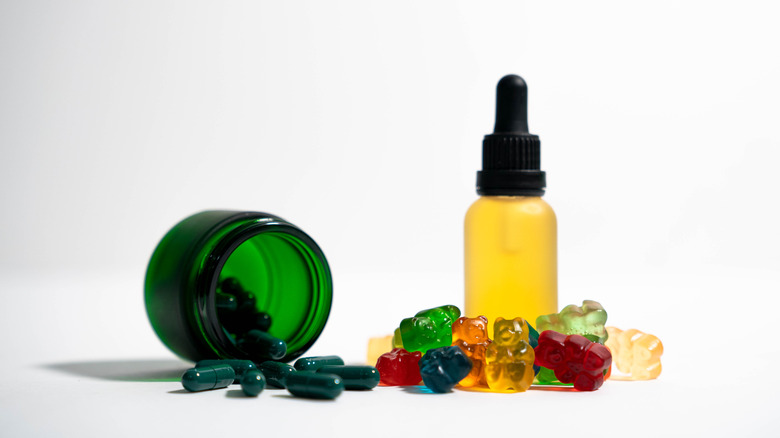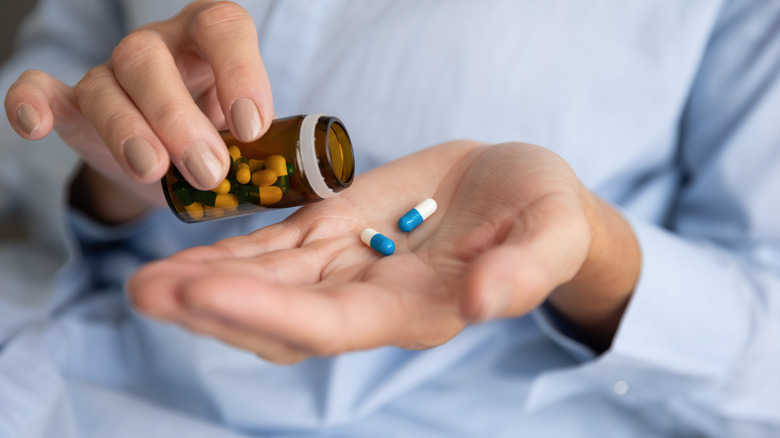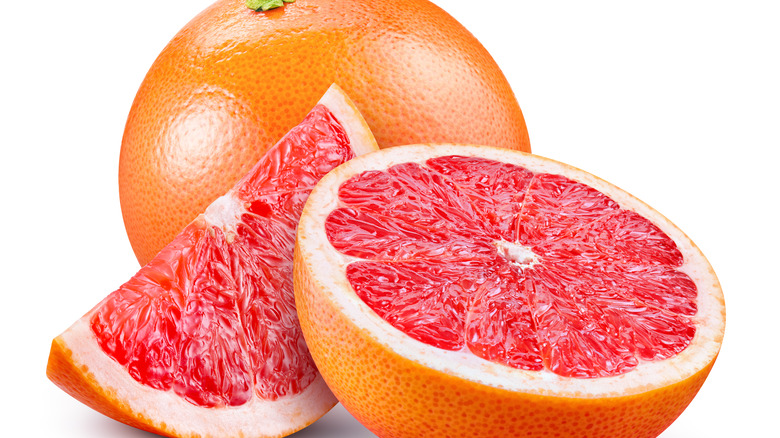How CBD Can Interact With Your Medication
CBD is short for cannabidiol, a compound from the cannabis plant, also known as marijuana or hemp, per MedlinePlus. There are more than 80 cannabinoids found in the cannabis plant. THC or delta-9-tetrahydrocannabinol is the chemical in cannabis that will cause you to feel high. CBD is taken from a type of cannabis sativa plant called hemp and has only tiny amounts of THC. Hemp has been legal in the United States since 2018, but can only be sold as a cosmetic product, not in dietary supplements or foods. You can find CBD in several forms, including oil, gummies, capsules, and vape pens. You can add oil to your food or beverages or take it orally.
MedlinePlus adds there are many possible uses for CBD, and it is possibly safe in doses of 200 milligrams for several weeks. Epidiolex, a prescription medication, has been prescribed in higher doses and longer than a few weeks. Avoid CBD if you're pregnant or breastfeeding, as it can contain ingredients that could be harmful. Children should also avoid CBD unless a doctor prescribes it. You may need to take a low dose if you have liver disease or Parkinson's disease.
You must discuss taking CBD in any form and dose with your doctor, especially if you take other medications, including herbs and supplements. You can experience interactions when combining medicine with CBD, which can cause some severe side effects.
Altering effects
Your body needs to break down or metabolize the medication you take. This process occurs in your gut and liver, and enzymes then get rid of the medication. Some medicines slow or speed up the metabolism, changing how your body processes these medications, causing an interaction. Interactions between CBD and drugs can result in serious changes. If it causes your medication to stay in your system longer than it's meant to, you might have more than one drug in your body at the same time. If it increases the level of medication in your system, you'll likely experience amplified side effects. If CBD causes your drug to metabolize too quickly, you won't have enough of it left in your body to treat whatever it's prescribed for (via a 2019 study published in Medicines).
Researchers from Penn State College of Medicine conducted a study on CBD and how it affects other medications. Their research found 139 medicines that can be affected by CBD by dangerously altering the concentration. It doesn't matter where the CBD comes from — prescription, over-the-counter, or illicit, it can still have dangerous effects. The list is a good starting point but will need to be updated when they learn more. CBD products can have varying doses and could contain other ingredients that may interact with medications. In addition, the list notes how the medication is affected by CBD by inhibiting, inducing the effects of, or competing with prescription drugs.
The grapefruit rule
Do any of your medications warn against ingesting grapefruit? The chemicals in grapefruit called furanocoumarins suppress CYP3A4, located in the small intestines, colon, and liver. CYP3A4 is crucial for metabolizing the medications you take. The chemicals in grapefruit, known as furanocoumarins, suppress CYP3A4, and CBD has a similar effect. As a result, CBD can cause a slowed breakdown of the medication in your body, causing too much of the prescription drug in your system and even leading to an overdose. There are over 85 medications that have an interaction with grapefruit, and it's not limited to one class of prescription drugs (via a 2013 study).
The Food and Drug Administration requires medications, both prescription and over-the-counter, to list the grapefruit warning on anything that can cause this interaction. Consuming grapefruit usually causes an increase in the medicine in your system, but its interaction with some medications can result in a decreased amount. One example of this interaction is with drugs that lower cholesterol levels, also called statins. Grapefruit causes too much of the drug in your body and increases your risk of muscle and liver damage, which can ultimately lead to kidney failure.
Check your medicines to see if they contain this warning. If you're unsure, consult your pharmacist or prescribing doctor.



